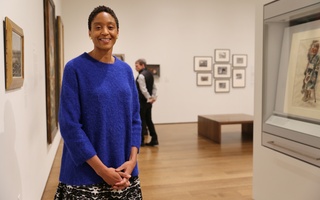On a drizzly evening in Indonesia, Harvard anthropologist Mary M. Steedly met her friend Patricia Spyer at the airport and took her on a motorbike tour around the city of Medan. By then, Steedly knew well the tumult and traffic of the city streets: in her 1993 ethnography “Hanging Without a Rope: Narrative Experience in Colonial and Postcolonial Karoland,” she describes in vibrant detail the yellow sudakos triple-parked at intersections and the peddlers swarming the sidewalks to sell noodles and cigarettes.
As the two longtime friends caught up over dinner, Steedly recounted the details of her research on the Karo people of North Sumatra. Spyer remembered how impressed she was as Steedly showed her notebook after notebook filled with drawings of leaves, scribbled place names, and painstakingly-detailed field notes on the nuances of her interactions with the local people.
“She had an incredible ear for language, for tone, for silences, for shifts in attention,” said Spyer, an anthropology professor at the Graduate Institute of Geneva. “For how voices are inhabited and shot through with the voices of others. How they’re haunted.”
Steedly, remembered by friends and colleagues for her eloquent writing, unfussy demeanor, institutional dedication, and passion for dogs, died on Jan. 4 due to breast cancer. She was 71.
Born in Ann Arbor, Mich. and raised in Charleston, S.C., Steedly received her bachelor’s degree from the University of North Carolina at Greensboro, her master’s in Folklore at UNC Chapel Hill, and her Ph.D. in Cultural and Medical Anthropology at the University of Michigan. She left the U.S. for the first time during graduate school, and somewhat unexpectedly wound up in Indonesia, where she wrote the dissertation that culminated in her first of two books and where she ultimately decided to devote her research.
In addition to years spent researching Indonesia, Steedly was fascinated by military culture in the U.S., the culture and history of her native South, and questions of memory and experience, gender and feminism, and colonialism and postcolonialism. She wrote on topics ranging from the process of collective memory and narration through Karo spirit encounters to the way Indonesian postcolonial anxieties manifested in horror films.
Steedly began teaching at Harvard in 1990 and was tenured from within the University in 1998, a feat her colleagues said was quite difficult at that time, when many professors were brought in for tenure from outside universities. For a significant portion of her career, she was also the only female senior faculty member in the department, according to her colleagues.
“She did it with a great sense of humor, never losing her cool,” fellow Anthropology professor Steven C. Caton said. “She was as far as I could tell totally unflappable, and with a sort of natural charm.”
Steedly rose up through Harvard’s Anthropology Department at a time when members of the “revered old guard” of senior male faculty began to retire, according to colleague Theodore C. Bestor. Eventually she became the “institutional memory of the department,” said Ajantha Subramanian, Steedly’s colleague in Social Anthropology.
Anthropology professor Michael Herzfeld remembered Steedly’s ability to help junior faculty members navigate the complexity of a life and career at the University.
“When I entered the field of Southeast Asian anthropology, in which she was an established specialist and to which, as a Europeanist, I was a newcomer, her wise counsel, insight, and empathy helped me to craft a productive trajectory,” Herzfeld wrote in an email. “We used to argue about many things, but those arguments, in which Mary’s special brand of irony often cleared a practical path through clouds of bureaucratic nonsense, were full of mutual affection and respect.”
For many of her friends and colleagues, Steedly’s immense skills as a writer and ethnographer made her work stand out in the field. She developed ethnographic writing as a genre unto itself, Subramanian said, treating her books as more than just academic reports. Steedly was slow and meticulous, Caton added, always mulling over “writerly” questions: finagling rhythms, searching for voice, and assessing balance. It took her years to weave interviews, oral histories, letters, and research into narratives.
In her lifetime, she published two books in addition to a slew of articles, and left a third book unfinished at the time of her death. The possibility of graduate students finishing the book on her behalf in the years ahead would be a nearly impossible task, Caton said, crediting her unique style.
“Her voice was so distinctive that you couldn’t really reproduce it successfully by using her notes,” Caton said.
In the classroom, Steedly worked to overhaul the graduate-level introductory course she taught with Caton. Her hallmark undergraduate course was Anthropology 1850: “Ethnography as Practice and Genre.” She was not interested in her students sounding like every other anthropologist, Subramanian said, but rather encouraged their own unique voices.
“She liked their quirks and their idiosyncrasies,” Subramanian said. “She didn’t try to hammer those out of them. She wanted them to actually inhabit them fully.”
Steedly’s encouragement of creativity extended to her dedicated mentorship of students, particularly her graduate students. Several colleagues mentioned that one of her Ph.D. students, Tahmima Anam, went on to become a well-known novelist.
She was very serious about her students, Spyer said. She worried about them, complained about them, praised them, and was happy for them.
“There’s a kind of generosity there,” Subramanian said.
In addition to her teaching and research, Steedly spent several years as the chair, director of graduate, and director of undergraduate studies for Social Anthropology in Harvard’s Anthropology Department. She also served as a member on committees for Women’s Studies, Social Studies, Folklore and Mythology, and the Office for Sexual Assault Prevention and Response.
As an active member of the Committee on the Status of Women at Harvard, she advocated for the hiring of women both in her own department and across the University. She did more than her share of labor in building the institution, Subramanian said.
“She never touted her own accomplishments, ever. Ever,” Subramanian said. “There was a kind of brusqueness to her. She kind of just went about her business,” she added.
Outside of Harvard, Steedly was a committed dog trainer and the president of a local agility club for dogs in Carlisle, Mass. She competed often in agility trials with her two Australian shepherds, adding medals and ribbons to a large bulletin board on display in her dining room, Bestor said. He recalled evenings in North Cambridge when she would walk her dogs by his house, stopping by for a glass of wine and a chat.
“The dogs were really integral to her life,” Bestor said.
She later moved to Lincoln, Mass. so she could have a backyard for her dogs to enjoy.
She loved to cook, and Spyer said she ate with relish whatever outlandish delicacies she encountered in her travels. Steedly especially enjoyed rooting for the Red Sox and the Patriots, reading novels, gardening, and birdwatching in her yard.
Steedly is survived by Nina DeLuca, with whom she shared a home for the last 18 years, her brother and two step-brothers, and her dogs June and Hopper.
Anthropology colleagues said a memorial service will be held later this month.
— Staff writer Sofia W. Tong can be reached at sofia.tong@thecrimson.com.
Read more in News
Institute of Politics Appoints Mark D. Gearan ’78 New IOP DirectorRecommended Articles
-
 ‘I’m Still Shaking’
‘I’m Still Shaking’ -
 The Harvard Arts Museums Welcome Makeda Best
The Harvard Arts Museums Welcome Makeda Best -
 ‘Elizabeth Bishop: A Miracle for Breakfast’ More of a Four-Course Meal
‘Elizabeth Bishop: A Miracle for Breakfast’ More of a Four-Course Meal -
 Danielle Allen Rises Through Harvard’s Ranks
Danielle Allen Rises Through Harvard’s Ranks -
Lessons From a Free ClinicIn the absence of a supportive physician, it is not uncommon for the patient to start blaming themselves and believe that their lifestyle choices have denied them the ability to claim their right to fair, compassionate treatment and respect.













